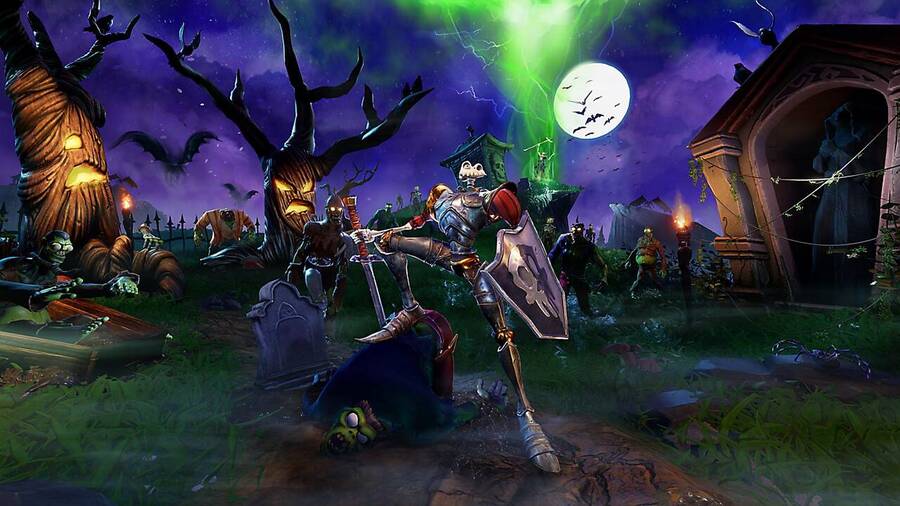
Next up in our ongoing series of composer interviews, we have the esteemed company of MediEvil composers Andrew Barnabas and Paul Arnold. They were the composing duo for the original release back in 1998, and we'll discuss how it felt to return to such a long-dormant property, why a new dynamic click track had to be made, as well as how they were able to make some new music for the spooky remake of this PlayStation classic.
Push Square: Despite having a very specific and iconic sound all its own, MediEvil has been largely out of the eye of the general gaming world for a number of years. How does it feel to get to bring the series, and particularly its music, back into the public consciousness? As someone whose very first PSone game was actually MediEvil, I was so incredibly excited about this remake and I’m excited to see a new generation (hopefully) fall in love with the series, too!
Subscribe to Push Square on YouTube167k
Bob & Barn: We both believed for years that it was Sony Cambridge’s strongest title so were just as keen to see a new title as everyone else, of course with a slight bias! It’s the game that we’ve been contacted about more than any other by a country mile -- many of whom ask about a MediEvil 3. Over the years the studio had tried many times to make a new MediEvil game but it seemed that there was no appetite to do so in Sony Europe. They’d even make fake trailers and ask us if it was real, so after a while we became quite dismissive of tales of a new MediEvil that is until we were sent footage of an internal Sony conference where Shawn Layden, Sony’s [now former] global chairman opened up his jacket to reveal a T-shirt with Dan Fortesque’s head! Then we got excited but Sony didn’t get in touch for a few months so we simply thought they’d re-use the live recordings from MediEvil: Resurrection. But they did get in touch in February 2018. Over the past few years we’ve found ourselves working more in Film and TV so were genuinely excited about coming back to games (our last game was 2016’s PSVR launch title RIGS) and especially to MediEvil. We’d helped to define the sound of the game over the previous three iterations; it was a style we knew well so were keen to jump back into it, as Bob says it was like slipping into an old pair of jeans that you’ve not worn in a while.
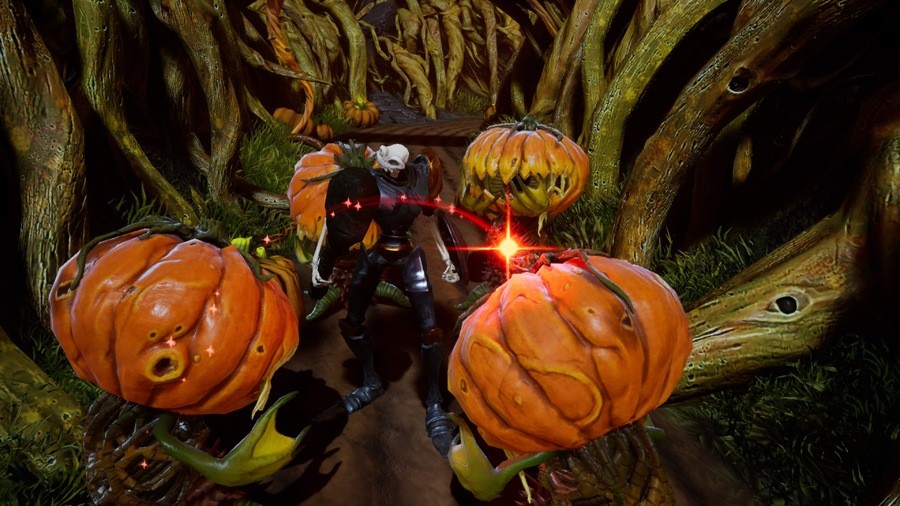
In addition to featuring a touched up and redone score of the original release, you also made some new music for the new version of MediEvil. How would you describe the process of both crafting new music for a title that already had a defined soundtrack as well as how to not make it too jarring? In my head, I’d imagine it’s something like crafting music for a sequel in a series where you want the sound to feel “right” but not necessarily the same. Walk us through that because I think that’s one of the most fascinating aspects of the popularity of full-on remakes this gen!
It was definitely the case of dusting off those MediEvil composing cobwebs after a 15-year hiatus, but we slipped back into it really easily, largely because we understand the musical language of MediEvil; the formulae we approached in terms of melody, harmony, humour, orchestration all came flooding back. For our first demo piece, we took the Graveyard track and developed it into something new. We both sat at the machine firing off ideas left right and centre. Having done the first piece it made us all realise that we needed to be more faithful to the original. It was, after all, a remake. Once we’d spent time transcribing our original tracks (there were no backups from 1998 to fall back on) the formula became once again cemented in our minds, and applying this to new tracks with 20 years of experience writing for an orchestra (MediEvil was the first game we’d written in that style) something new and hopefully improved would emerge.
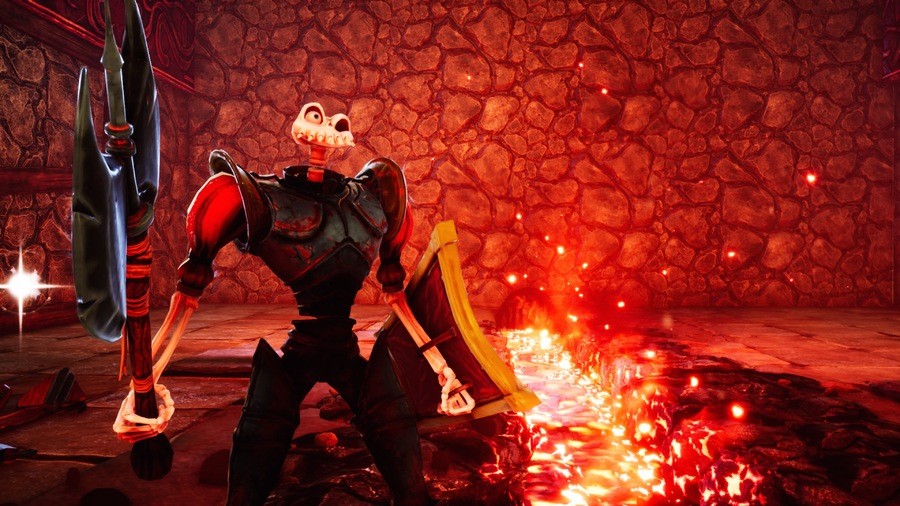
What did become a challenge was in taking non-interactive cues from 1998, extract what we felt was the essence of these tracks, rework the backing to be more suitable for interactive work, add additional elements to help give these tracks more variety and different layers of intensity, while still having them feel like they’re the original cues.
I’m to understand that, originally, Sony didn’t actually want (or at least have any interest in) this new music initially. How on Earth did you convince Sony to let you do brand new music for a game that already had its score?
It was a fine line but we argued that the audience would want to hear new music, not just the original tunes updated so we went through the cues from the original game and highlighted what we felt were tenuous tracks and suggested that we write something new for those; fortunately they agreed! The original Sony brief was to recreate the original tracks just in samples -- just to a much higher fidelity than previously possible. We weren’t keen on this so made an alternate proposal to have cues from the original game recorded live, bolster this with live recordings from MediEvil: Resurrection, and write brand new MediEvil cues.
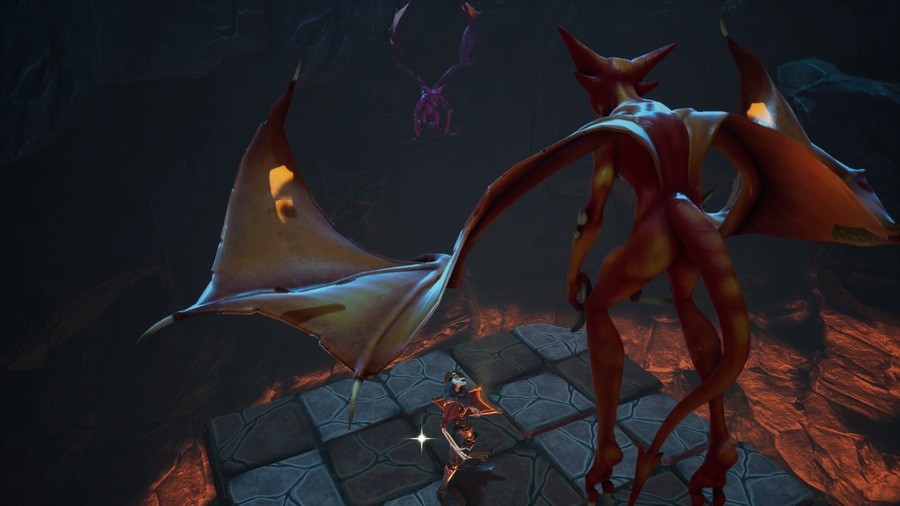
So the reworked score for this remake is a patchwork of brand new music, touched up original music, as well as music from 2004’s PSP remake. Was there a special approach required to merge disparate elements together like that? And what was the process of normalising the sound like? Did one version of the music stand way out in the way it was mixed as opposed to the others? Or was melding all these releases together a bit smoother?
What really helped here was the brilliant team at Sony PlayStation’s music department; this really was a step up. We had access to the original recordings from MediEvil: Resurrection, although we’d forgotten an important point -- because the music in MediEvil Resurrection wasn’t interactive, our wonderful orchestrator / conductor Nic Raine said that the orchestra will perform better without recording to a click track so we had these all performed live; this caused us problems when adding new material, so we had to create dynamic click tracks for each cue which took a long time. Scott, Eddie and Anthony are fabulous mix engineers who took the MediEvil: Resurrection recordings and remixed them and matched them pretty closely to the new 2019 recordings. The 2019 recordings had one major difference: they were recorded in sections rather than all together -- by sections I mean brass, woodwind, strings, etc even to the level of granularity that we’d record instruments playing long legato notes in one session and short rhythmic notes in another. It also helped that we recorded the same orchestra in the same room with the same excellent engineer, Jan Holzner. The original score was written using one sampler and one synth. To keep some consistency, we bought the plug-in version of the synth for those cheesy but very recognisable synth sounds (check out Crystal Caves).
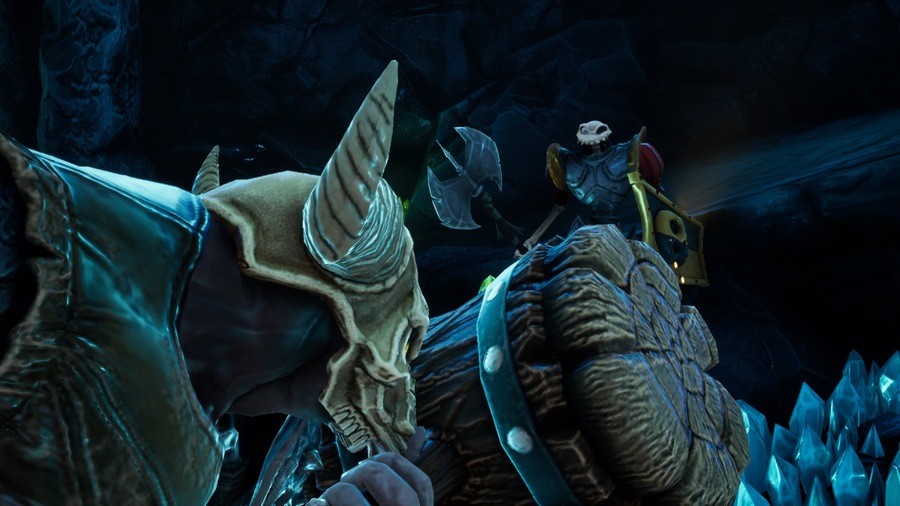
Another thing that helped consistency between new and old were the additional elements that we added to all tracks. Because the MediEvil in-game music is by and large quite slow, when things heat up the music didn’t do anything to reflect this, so we came up with a formula of adding percussion / percussive instruments and even the odd improvised solo as an overdub, and we could do this to all tracks. We had lead melodies performed on different instruments for variety, new counter melodies and harmony lines which the code would choose when it was most appropriate to play.
Sony PlayStation’s music team ordinarily only work on the really big titles (The Last of Us, Spider-Man, God of War, etc) but went above and beyond. This was a smaller title for them, but they were hugely passionate.
Keith Leary, who greenlit our alternate proposal for the score. Monty Mudd, who worked closely with us throughout both supervising the score (and who did a fantastic job of implementing it in-game). The mix engineers I mentioned above. George Weising (who oversaw the project, the soundtrack and filmed the recording sessions for the soundtrack app) and David Thach (both from Sony) who shepherded the project (and managed to save the Mac during the brass recording session when ProTools kept crashing) -- they all wanted to do it right and by golly they did!
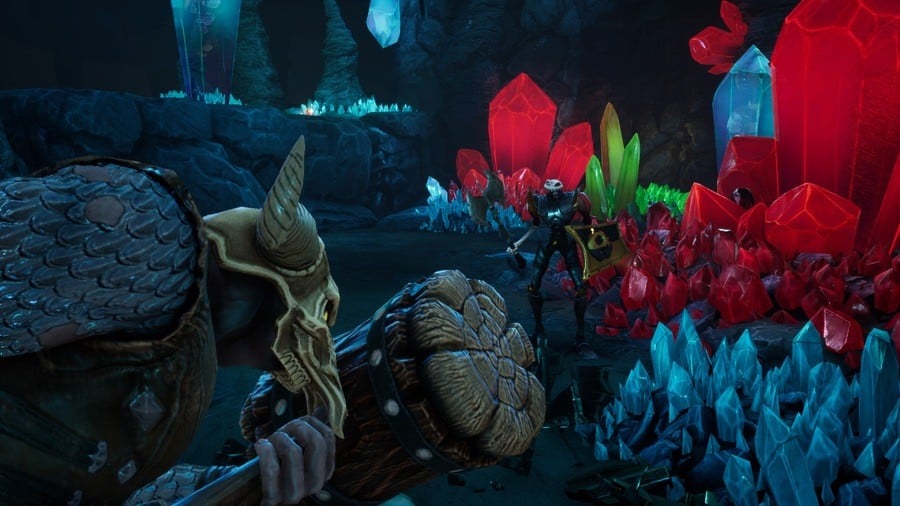
We knew we wanted to enhance -- if possible -- every track from MediEvil, be it a live recording of a 1998 track, bolster a live recording from MediEvil: Resurrection with overdubs or by writing a brand new track, our philosophy was how far could we develop the original music but still have it be recognisable as to not put off purists. The trends we like hearing in current game music is to play as few elements as possible, really simple implementation but with enough variation to grow and expand as the player progresses. What we found surprising is just how much you can strip away the layers of a track to virtually nothing and still have it be recognisable. This gave us a lot more scope; we were getting more drastic in our feedback to Sony, cut out more!
What are your general feelings about the scores you guys made after this much time? Does it still feel fresh in your minds creatively, or does it feel more like you’re outsiders looking in on it? And by that same extension how does the fact this game is still something people are clamouring for 20 years on make you feel?
It’s a combination of a few different feelings. Taking any creative craft and going back to what you did 20 years ago, you hope you’ve improved since, and definitely a few times we listened to the original and went, “Oooooh wouldn’t do that.” At the same time, we were young and wrote melodies we still have a hard time getting our heads around because they were so different, so you find yourself questioning just how original those decisions would be if you approached it now. We’re both technically far better orchestrators, that’s for sure! We were bowled over by how much reverence Sony and Other Ocean have for the original so were acutely aware that we wanted to respect what had come before but with the knowledge and what the technical capabilities of the PS4 would enable us to do, in essence it was a dream to hear and see these tracks recorded live, updated, enhanced but still true to source. Social media didn’t exist in 2004 so the direct connection we now have to fans of the game means that we’ve been inundated with people letting us know what they think of the new score – spoiler, they like it, there are a few who said they prefer the original and some who simply dislike interactive music but you can’t please all. Having a dialogue with the fans also helps - e.g. we learned that the soundtrack app which comes with the deluxe version of the game doesn’t allow users to export the music to a USB stick, something which other soundtrack apps allow so [this was a more rampant problem very early in the PS4’s life] we’ve gone straight to Sony to ask them to fix this. It’s definitely given us the appetite to write more, so fingers crossed the game sells enough to warrant a sequel.
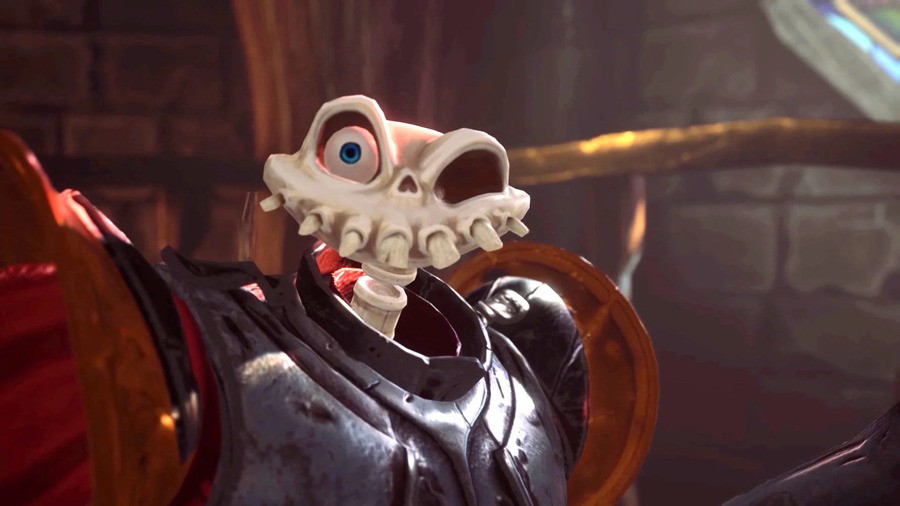
When viewing the old score, anything you don’t remember doing back in the day with the music that you really like? How about the inverse? Anything you really wanted to change? And did you?
Yes, definitely, one thing we noticed is that our string writing for example, was very simplistic in some areas. On the first game we used a basic "string" sound, but now we write string lines individually for each instrument and they sound so much better! This is something we could do to the original tracks and not lose their essence, just improve on what was there. We also took advantage of interactivity to add new elements, e.g. have melodies played on different instruments to give it a different colour, even to add the odd solo. We wanted to write new music simply because we know that as fans ourselves, we’d always want to hear something new!
How would describe your time revisiting MediEvil this time around in relation to the PSP remake from 2004, and especially from the original release of the title? I can’t imagine the processes were similar given that the groundwork for the music had already been done the first time around. Anything unexpected working on the game this time around as opposed to either of the previous times?
The brief was different this time around. Piers Jackson, the producer of MediEvil: Resurrection, had a clear idea of what tracks he did and didn’t like from the original and was keen for us to write new, improved ones. And here with the PS4 version we had the opportunity to make an interactive score, something we knew was never going to be an option for the PSP. Apart from that, the feelings were pretty similar: we were excited to revisit a title and expand in a way that we couldn’t do with the previous versions. Each time was a step up. MediEvil 1 & 2 were all done in synths, MediEvil Resurrection was performed live but no interactivity and here it’s all live and interactive -- blooming marvellous!
And as my final question for first time interviews, I have a tradition of asking how you found your way into games? What brought you guys to the industry? Was it something you actively sought out? Or did it just kinda happen?
For me, Barn - I came up through the Amiga Demo scene and landed my first gig as a composer for the game SWIV in 1990, ran a games music label whilst studying at university, and went in-house in 1995 to work as Millennium Interactive’s first in-house composer -- largely because they’d built the best recording studios I’d ever seen -- who went on to develop MediEvil. So yes, it was something I actively sought out. I hit my 30th anniversary a couple of weeks ago and still loving it! [Congratulations Barn!]
For Bob who was studying for a Master in Music Technology in York, he saw a job advertised for a junior sound designer at a games company in Cambridge, applied for it and got it! He always wanted to write music and his first track he wrote was Cemetery Hill for MediEvil!
And that does it! LIke Bob & Barn mentioned, the soundtrack is only available through an app on the PS4 itself if you bought the Deluxe Edition of the title. But hopefully we'll be able to listen to it on its own away from the console down the road. The charming soundtrack has new life in this remake, and it deserves as much attention as gamers can muster.





Comments 5
It's still stickied for now, but just in case @RogerRoger
I enjoyed all of MediEvil and glad I bought it.
@RogerRoger Merry Christmas to you too!
Yeah the situation around this game I found to be especially unique. Not only not the first remake, but the same composer team working on the rework was especially interesting to me! Agreed, this one's in such a uniquely interesting spot!
@RogerRoger There's one more almost completely done interview that should be out verrry soon with a certain Jesper Kyd
I just tried the demo a bit and one of the things that really stood out is the soundtrack. It actually is more interesting to me than the game itself, and it almost sounds darker than what's happening on-screen at times.
But it just goes to show that playing music live, with real instruments, tends to move a person more than just going all "synthetic" (although I have nothing against synthesizers).
Something similar can be said for "The Order" as well, which has the sound of a smaller chamber orchestra as opposed to a massive "epic" sounding Hollywood-style orchestra with highly compressed percussion and so on. It just has a lot more charm and soul to it than most soundtracks, as does the soundtrack to 'MediEvil'.
Just too bad it doesn't seem to be on Spotify for easy access, but suppose this game is too recent for that and it might come later.
I'm not so sure about purchasing the game, as the game itself didn't impress me much. It's also still 20-30 Euros (depending on which version) on sale, which is a little too much for me for this type of game. It'll have to wait.
Show Comments
Leave A Comment
Hold on there, you need to login to post a comment...